

Topics
CBO Sees Budget Tapping Social Security
Nine Countries Targeted on Concern List as a Threat to Religious Freedom
Clashes opposes Football fans and Bassidj members
Milosevic gives TV interview from cell
Iran police plan moral crusade
Bosnian Serb officer surrenders
Abbas Amir-Entezam, jailed since 1981 for espionage, was hospitalized
US should focus on Iran, not Iraq -- Israel
Khatami urges Islamic countries to break ties with Israel
Allied planes bomb Iraq
Lebanon rounds up Christian opposition
An insulted president Khatami to swear in today, at last
Sharon's Turkey visit divides loyalties
Leila Pahlavi took fatal drugs cocktail -- inquest
Iran says arrested suspect over serial killings
Iranian minister condemns floggings
Iran seeks dissident in US
Woman stoned to death for adultery and murder
Stonings should stop in Iran
Bush calls for relaxed immigration rules
Defiant Milosevic rejects 'political' trial
Guards 'damage' Iran's heritage
Iranian women demand equal treatment
Egyptian screen star dies
![]()
CBO Sees Budget Tapping Social Security
WASHINGTON (Reuters) - The U.S. Congress' non-partisan budget watchdog said on Monday the government will
use about $9 billion of politically sensitive Social Security revenue to balance its budget this year, contradicting
White House promises to leave Social Security untouched.
In a widely anticipated report, the Congressional Budget Office said the government will take in about $153 billion
more than it spends in the current fiscal year, which ends in September. But if Social Security and postal service
revenues are excluded, as many Democrats and some Republicans on Capitol Hill argue, the budget will be in deficit
by about $9 billion.
The report ratchets up the partisan heat as the White House and Capitol Hill are set to get to work on a budget for
the 2002 fiscal year later this month.
In its own projection released last week, the White House forecast it would barely avoid using Social Security funds
this year, projecting a $158 billion surplus overall and a $1.9 billion so-called "on-budget" surplus, that is, outside of
Social Security and postal services.
Through a quirk in federal accounting, spending Social Security tax
receipts does not shrink assets in the trust fund, but it slows the
pace of federal debt repayment. In recent years, extra Social
Security funds have been used for debt repayment.
![]()
Nine Countries Targeted on Concern List as a Threat to
Religious Freedom
CNSNews.com - The U.S. Commission on International Religious Freedom
issued a report recently with regards to nine countries that it has suggested to
the State Department for designation as "countries of particular concern."
The commission selected Burma, China, Iran, Iraq, Laos, the Democratic
People's Republic of Korea (North Korea), Saudi Arabia, Sudan and
Turkmenistan for review by the State Department. Its findings were reported in
a letter to Secretary of State Colin Powell on August 16.
"The Commission reviewed the evidence that it has at its disposal. This
includes the State Department's report on religious freedom and human rights
reports," said Lawrence J. Goodrich, director of Communications for the U.S.
Commission on International Religious Freedom.
"It includes our monitoring of news reports, religious organizations, human
rights groups and objective groups," Goodrich said of the selection process.
Of the countries nominated this year, Burma, China, Iran, Iraq and Sudan were
designated "countries of particular concern" previously by the State
Department in 1999 and 2000.
"In China, numerous Falun Gong practitioners throughout the country have
been subjected to psychiatric detention and abuse, as part of the government's
crackdown on that group," the commission said.
It was also reported that more than 35 members of the underground Roman
Catholic Church (including two bishops and 23 priests) were arrested within the
year.
The commission noted that Sudan and China have seen an increase in severe
violations of religious freedoms.
The Human Rights Watch reported in May that Sudan was included in the
United Nation's Commission on Human Rights even though several human
rights violations had been recorded.
The International Olympic Committee selected China to host the 2008
Olympics earlier this year.
"No country has the right to have the Olympics, so this would have been a
golden opportunity to distance ourselves from China to point out what is
happening," said Paul Marshall, senior fellow at the Center for Religious
Freedom.
"The government in North Korea suppresses all independent religious activity;
persons engaging in public religious expression or other unauthorized religious
activities continue to be arrested and imprisoned. Since July 1999, there have
been new reports of ongoing torture and execution of religious believers," the
commission reported.
The State Department will now deliberate and follow up with designations of
these countries to its "countries of particular concern" list based on the
commission's recommendation. "We expect to see by September, at least, the
preliminary list," Goodrich said.
The Commission noted that the State Department had designated the
Milosevic regime in Serbia as a particularly severe violator of religious freedom
in 1999 and 2000, but withdrew the designation after the Milosevic regime was
removed from power in 2001.
If the State Department were to designate any of the countries to its "countries
of particular concern" list, they would be subject to U.S. action under the
International Religious Freedom Act of 1998.
"The law provides for a full spectrum of actions that the president has as
options. They can range anywhere from diplomatic demarches to fairly serious
economic sanctions. Or, the president has the option under the law to not take
actions for national security reasons," Goodrich said.
![]()
Clashes opposes Football fans and Bassidj members
First reports are stating about sporadic and violent clashes which have started in several areas
neighborring the Azadi Stadium (former Aryamehr) of Tehran.
Based on these reports, the Football fans have reacted to the brutal attacks of Bassidj
members trying to stop the celebration of Iran's win over Saudia Arabia.
Witnesses are stating that Bassidjis were seen using Clubs, chains and even Trained dogs
against the fans.
![]()
Milosevic gives TV interview from
cell

Mr Milosevic called Fox TV
from detention in The Hague
The International War Crimes Tribunal has given a warning to the former Yugoslav president, Slobodan Milosevic, after he succeeded in giving a live interview to a US television network.
Mr
Milosevic, who is accused of war crimes in Kosovo, on Thursday phoned Fox News
from the tribunal's detention centre in The Hague where he is being held.
Mr Milosevic maintained his
innocence, attacked the war crimes tribunal and said he was sorry lives were
lost during ethnic violence in Kosovo.
The former Serb leader, who refuses
to recognise the legitimacy of the tribunal, is next due in court on 30 August.
'Sorry'
"All of us are sorry for the
death of any, any person all around the world, there is no question that anybody
is happy for the death of any person anywhere," he told Fox News.
He accused the tribunal of
fabricating evidence against him.
"Of course they have no
evidence. They cannot have evidence for things that never happened... But this
so-called tribunal has one specific characteristic. They are able to fabricate
the evidence."
He said he had never ordered his
troops to kill civilians and that they were under strict orders to
"eliminate terrorist groups".
There were clear orders that those
individuals who had committed this type of crime should be arrested and
punished, he said.
He accused the government in Belgrade
of selling him to The Hague in exchange for American money.
He compared this process to the slave
trade, saying he thought the sale of human beings was something which belonged
in the distant past, not in the 21st Century.
Embarrassment
The International War Crimes Tribunal
is clearly embarrassed by Mr Milosevic's ingenious attempts to publicise his
cause.
The former president also managed to
speak to members of the Russian communist party, through a phone call to his
brother in Moscow.
The tribunal spokesman, Jim Landale,
told the BBC that the television interview was regrettable and something which
should not have happened.
He said media interviews were not
allowed, although detainees did have access to a phone and a monthly phonecard
worth $31 to call their friends, family and lawyers.
Mr Milosevic had claimed not to have
been aware of the restriction, but Mr Landale said he had now certainly been
made aware, and warned that if abused, communication privileges could be
restricted or withdrawn altogether.
![]()
Iran police plan moral crusade
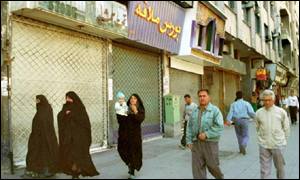
Shops and shoppers have been warned
The Iranian authorities are planning a crackdown on loose morals on the streets, targeting shop keepers who play loud western music and cafe owners who serve women wearing heavy make-up.
In an official statement, police warned shop owners that their stores would be shut down during a campaign starting on Sunday if they were found to be displaying "the signs and symbols of depravation".
Regarding the spread of decadent western culture in society, police have seriously risen up against the propagators of corruption
Iranian police statement The "symbols" to be singled out by the police include the display of lingerie and naked mannequins in shop windows as well as the sale of objects featuring western stars or women not fully covered.
The police announcement follows a series of recent public floggings, mostly of young men accused of drinking alcohol or making sexual advances.
Monkeys and mannequins
A ban on the sale of dogs or monkeys, which have become increasingly popular as pets in parts of Iran, is to be enforced during the police campaign.
Restaurant and cafe owners have also been warned of trouble if they are discovered serving women who are not adhering to the strict Islamic dress code or are wearing heavy make-up.
Not for sale
And the police will be listening carefully to the tunes tinkling in shopping malls, switching off illegal western music and music that can be heard outside.
"Regarding the spread of decadent western culture in society, police have seriously risen up against the propagators of corruption," said the statement carried by the official INRA news agency.
![]()
Bosnian Serb officer surrenders
A senior Bosnian Serb officer has arrived at The Hague to face war crimes charges after surrendering to Nato troops in Bosnia.
Lieutenant-Colonel Dragan Jokic faces charges of murder, extermination and persecution under an indictment from the tribunal which was unsealed on his arrival at the detention centre in the Netherlands.
He is accused of involvement in the 1995 massacre at Srebrenica of 7,500 Bosnian Muslim men and boys.
His surrender comes a day before Colonel Vidoje Blagojevic - seized by Nato forces in the Bosnian Serb republic last week - is due to appear before the tribunal to face genocide charges connected with the massacre.
![]()
Abbas Amir-Entezam, jailed since 1981 for espionage, was hospitalized
Tuesday [14 August] to undergo treatment over an unknown suffering with his
prostate, his lawyer said.
"The doctors started the treatment after my client was hospitalized,"
Mohammad Ali Safari told IRNA by phone.
He said that his client may need to undergo surgery operation. Following the
treatment, he will be remanded in custody in Evin Prison unless the doctors
advise him to stay home for convalescence period," Safari added.
Amir-Entezam who was released in 1997 after serving 17 year sentence for
spying, was detained in September 1997 after making critical statements about
the former head of the Evin Prison near Tehran, Asadollah Lajevardi, who was
assassinated in August that year.
He was a deputy prime minister and government spokesman in the provisional
government headed by Mehdi Bazargan after the overthrow of the shah in
February 1979.
Regarded as a liberal, Amir-Entezam is considered Iran's longest-serving
political prisoner. He had enjoyed only a brief spell of freedom before his
re-arrest.
![]()
Khatami urges Islamic countries to break ties with Israel
TEHRAN, Aug 14 (AFP) - President Mohammad Khatami on Tuesday called on
Islamic countries to break ties with Israel and "take back" the rights of the
Palestinian people, the state IRNA news agency reported.
"All Islamic countries and freedom-lovers should take back the rights of the
innocent Palestinian nation from the butchering Zionist regime," Khatami said
during a phone conversation with his Lebanese counterpart Emile
Lahoud.
Khatami underlined the "need" for the Islamic world to "break ties with Israel,"
affirming that "what is happening in occupied Palestine has injured the hearts
of Muslims across the world."
"We have to ask all concerned countries and organisations to prevent the
continued destruction of holy places and the 'Zionisation' of occupied
Palestine," Khatami said.
He called on the UN Security Council to send "unbiased" forces to the region in
order to establish security.
Lahoud for his part said "Palestinian victory is near," and lauded Iran for its
support of Lebanon and the Palestinian people.
Iran does not recognise Israel and favours the return of all Palestinian refugees
to the land where the Jewish state was created in 1948, followed by a
referendum on the future of the territory.
Tehran also backs Hezbollah guerrillas who helped oust Israeli troops from
south Lebanon last year after more than two decades of occupation.
The death toll since the Palestinian intifada, or uprising, began last September
now stands at 718, including 550 Palestinians and 146 Israelis.
![]()
US should focus on Iran, not Iraq -- Israel
Warning that Tehran would have a nuclear
bomb within four years, Israeli Defense Minister Binyamin
Ben-Eliezer on
Monday told Washington it should focus on Iran, not Iraq.
Although Iran threatens the entire free world, including the United States, the
United States is focusing on Iraq he told the Israel-American Chamber of
Commerce and Industry.
Iran now has the Shehab 3 ballistic missile with a range of 800 miles and
chemical and biological warheads, Ben-Eliezer said.
"I believe they are entering (the development) of the Shehab 4 that will have a
range of 2,000 kilometers (1,200 miles)," he continued, adding that the Islamic
republic would have a nuclear bomb within four years.
The Iranian-backed Hezbollah in Lebanon has become a strategic threat to
Israel, he also said, with an arsenal that includes 8,000 Katyusha rockets,
long-range rockets that might reach Hadera, which is halfway between Haifa
and Tel Aviv, he said.
"They are ready to make provocations day and night," he added.
While Israel had hoped Syria would restrain Hezbollah and twice tried to send a
message to Syria by attacking Syrian targets in Lebanon but, said
Ben-Eliezer, Hezbollah's leader Sheikh Nasrallah has a green light to do
whatever he wants.
The Israeli minister also criticized UNIFIL, the United Nations force along the
Lebanese-Israeli border, which he said, set up a "film company."
He was alluding to film an Indian soldier shot before and after Hezbollah
abducted three Israeli soldiers last October. UNIFIL monitors and reports, but
does not act to prevent violations, he complained.
He noted UNIFIL evacuated a position near the border village of Ghajar that
Hezbollah then moved into.
Ben-Eliezer hailed Israel's relations with Turkey.
"There is an excellent relationship in all aspects," he said. Reporting on a
one-day visit there three weeks ago, he said: "They asked me how they can
help." He said he replied, "By convincing Bashar to return to the negotiating
table instead of supporting Hezbollah." The defense minister was referring to
Syria's President Bashar Assad.
![]()
Analysis: Struggle for Iran's
future

Iran's
conservatives wield great power despite divisions
By Middle East analyst Roger Hardy
Iran's reformist president, Mohammad Khatami, has finally been sworn in for a second four-year term.
The ceremony was supposed to take place on Sunday, but was delayed by a dispute between conservatives and reformists over appointments to a powerful state body.
In the speech that followed his swearing-in, President Khatami made it clear his main objective remains unchanged, despite the setbacks he faced during his first term - to create an Islamic democracy based on the rule of law.
In a clear reference to the events of the last few days, he said the nation had to oversee powerful state institutions.
The unseemly row that held up his swearing-in showed all too clearly that the conservatives who control some of the most powerful state bodies have no intention of opening them up to democratic accountability.
![]()
Allied planes bomb Iraq
The raid was the biggest
against Iraq since February
British and American war planes have attacked air-defence sites in southern Iraq in the heaviest raids against Iraq by coalition forces for six months.
An Iraqi military spokesman told the official Iraqi news agency that one person was killed and 11 injured in the attack.
He said that civilian facilities in Wassit and Zi Qar provinces were targeted.
But the Pentagon said three targets which were "contributing to the effectiveness of the Iraqi air defence system" were destroyed.
They included an air-defence control centre, an anti-aircraft missile site and a long-range radar station.
A US military official told French news agency AFP the raid was in response to "recent increases in air-defence firings against coalition aircraft."
The
Pentagon said about 20 US and British attack planes and 30 support aircraft
carried out the attack at midday local time (0930 GMT).
It was the second raid this week and
the most intensive since 16 February when Allied planes attacked air-defence
targets near Baghdad.
US military officials said all the
planes returned safely from Friday's mission.
![]()
Lebanon rounds up Christian
opposition

Syrian troops have withdrawn
from Beirut but remain elsewhere
By Kim Ghattas in Beirut
The Lebanese army intelligence has arrested around 150 members of two Christian groups which represent the main force in the opposition to the Syrian presence in Lebanon, where Damascus maintains some 20,000 troops.
Those
arrested on Tuesday evening were mainly followers of two parties. One is the FNC
- the Free National Current, which is tied to the exiled Christian leader Michel
Aoun.
The other is the Lebanese Forces - a
disbanded Christian militia whose leader, Samir Geagea is in jail.
Most of the arrested are students,
but there are also several well-known party officials.
![]()
An insulted president Khatami to swear in today, at last
TEHRAN 8 Aug. (IPS) A humiliated but defiant Majles (parliament) of Tuesday surrendered to the will of the lamed and badly diminished leader by electing two new jurists to the Guardians Council (GC) with only 68 and 62 votes against 162 abstentions, thus paving the way for the Presidentās oath taking scheduled for today, Wednesday.The reformist-dominated Majles was faced with possible dissolution after Ayatollah Ali Khamenehe'i confirmed late Monday night an earlier decision by the Assembly for Discerning Stateās Interests, or DA suggesting a change in the Majlesās internal regulations that stipulates jurists proposed by the Judiciary as GCās jurists should be elected with absolute majority, no matter how many sessions or vote casts.
From a mere consulting institution formed eleven years ago to provide the leader with advise on different matters as well as arbitrating differences between the GC and the Majles, the 32-members DA appointed by the leader, under the chairmanship of former president Ayatollah Ali Akbar Hashemi-Rafsanjani has emerged a rival for both the reformist-controlled Parliament and government
Lawmakers, including some conservatives, had rejected last week all but one of the seven jurists presented by the Judiciary Chief Ayatollah Mahmoud Hashemi-Shahroudi, on the ground that not only the candidates did not fit for the job, but also belonged to one specific political current, meaning the conservatives who already control the powerful GC.
Arguing that it could not attend the searing in ceremonies of President Mohammad Khatami on Sunday unless fully completed, the GC triggered an unprecedented row between the Legislative and the Judiciary.
In three successive decisions some experts described as "blatantly provocative" and "anti-constitutional", Mr. Khamenehe'i first postponed the oath taking ceremonies, referred the dispute to the DA and ended by ordering the changes in the Majles procedures, thus reducing the 292 seats House into a rubber stamp chamber in the one hand and enhancing the powers of the DA on the other.
Analysts said though they were expecting the DA to take the side of the Judiciary, but they could not imagine Mr. Khamenehe'i dealing such a fatal blow to the Majles.
"This is the first time in Iranās contemporary history that a ruler, even the most authoritarian and despotic of them, has dared to so blatantly humiliate the Majles, supposedly the regimeās most important and honoured power and openly slap lawmakers in the face. In fact, this is an unforgivable insult to the entire nation", commented angrily one jurist who asked for anonymity.
The leaderās provocative decision to back ADās illegal decision in fact confirms a scenario worked out by Mr. Hashemi-Rafsanjani to use the absolute powers of the leader for replacing gradually the Parliament with the AD, placing this institution next, if not over the three other powers, analysts said.
"It was clear from events in the past weeks that efforts are under way to transfer the dispute between the Judiciary and the Legislative to the DA for final decision", said Deputy Speaker Mohsen Armin, who is a member of the Islamic Revolution Mujahedeenās Organisation, one of the Second Khordad Coalition factions that supports the embattled President and his promised reforms, all foiled by the conservatives.
On the surface, the Majles might look as having bowed to the autocratic and egocentric Khamenehe'i, but by refusing massively to endorse the jurists, the lawmakers not only have slapped him in the face, but also treated him as the leader of the minority faction of the leadership.
"No matter how some analysts look at the events, describing the leaderās decision as an insult to the Majles, but the reality is that with their 162 blanc bulletins, the lawmakers in fact proved their determination to defend peopleās will", commented MM (Member of the Majles) Mr. Qolam Heydar Ebrahim Baysalami.
Though there had been not a
single word from Mr. Khatami during the four "tragic" days, but
sources close to him described him as "very depressive, deeply hurt and
feeling badly humiliated and betrayed".
![]()
Sharon's Turkey visit divides
loyalties

Turkish Islamists condemn
Israel's response to the Palestinian intifada
Israeli Prime Minister Ariel Sharon is visiting Turkey on Wednesday, where he says he will urge the Turkish Government - one of Israel's few allies in the Middle East - to put pressure on the Palestinians to end their 10-month-old uprising.
But
as the Palestinians have called on Turkey to cut ties with Israel altogether,
Ankara finds itself in an uncomfortable position.
Turkey is becoming increasingly
uneasy about Israel's tough response to the Palestinian intifada.
It strongly supports Palestinian
claims to statehood in the West Bank in Gaza, but it also has close
relations with Israel.
The two countries co-operate on
defence and security matters.
![]()
Leila Pahlavi took fatal drugs cocktail -- inquest
LONDON, July 25 (AFP) - The youngest daughter of the late shah of Iran
died after taking a cocktail of cocaine and prescription drugs in the suite of her London hotel, an inquest here heard Wednesday.
Princess Leila Pahlavi, 31, had stolen prescriptions for drugs from the
desk of her family doctor, the coroner's court in central London was told.
Staff at the Leonard Hotel in west London found her dead in her bed in the four-room suite on June 10.
Pathology tests indicated she had taken fatal levels of Seconal, a drug for epilepsy and insomnia, as well as cocaine and pain killers.
The inquest was adjourned without a verdict while her doctor, Mangad Iqbal, provides a full list of drugs he had prescribed for the princess
during three visits this year.
The coroner's court was told that the princess had a history of depression and eating disorders which had seen her receive treatment all over the
world, including London. She had been visiting London last month from her home in New York when she
died.
Iqbal said he had seen her three times in 2001 and given her prescriptions for various symptoms. On the third occasion, he said, she stole
prescriptions from his desk while he was out of the room. Two prescriptions were for her and three others for different patients, he
told the inquest.
Coroner Paul Knapman adjourned the hearing for two weeks until August 8. He said Iqbal's evidence was inconsistent with statements he had given to
police. He said: "I want to know what she was prescribed for what purpose and what
safeguards went into it.
"As a result of the evidence given today there do seem to me to be a number of outstanding matters that need to be looked into."
![]()
Iran says arrested suspect over serial killings
TEHRAN, July 25 (Reuters) - Iran's police chief said on Wednesday a 39-year-old man had been arrested in connection with the slayings of 16
women all found choked to death with their headscarves in and around the holy city of Mashhad. Brigadier-General Mohammad Baqer Qalibaf said on
state television that the suspect, a married man with three children, had been arrested in the northeastern city after a two-day operation.
The bodies of the 19 victims, convicted prostitutes or drug addicts, were discovered in the past year. Qalibaf said three of the murders were
believed to have been carried out by other killers. He said arrests had been made in connection with the three other murders.
The killings were dubbed the "spider murders" because the killer used headscarves to entangle and suffocate the women as a spider uses a web to
trap its victims. The Iranian authorities have come under mounting pressure to solve the
murders, which occurred in and around Mashhad, the site of a major Shi'ite Muslim shrine.
Qalibaf said the suspect, who was a builder, was believed to have acted alone and not part of any organised group, as some press reports had
suggested. Authorities in Mashhad had been rounding up 500 prostitutes because they
were considered potential targets.
A special police squad was sent to Mashhad from the capital Tehran in April to help the local authorities. The police had promised before the
discovery of the last two bodies that they would come up with results soon.
![]()
Iranian minister
condemns floggings
BBC:By Iranian affairs analyst Sadeq Saba
Iran's pro-reform Interior Minister, Abdulvahed Moussavi Lari, has condemned the increasing number of public floggings of young people drinking alcohol.
In an interview with a government newspaper Mr Lari said public whippings in this day and age had serious political and social consequences.
In the latest incident, 25 men were whipped in public in the capital, Tehran, on Friday for consuming and selling alcohol, which is forbidden in the Islamic Republic.
Mr Lari, who is a close ally of President Mohammad Khatami, complained that as the main official responsible for security in the country, he was not kept informed about such harsh decisions.
He also criticised judges for ordering the punishments without considering their implications. Apart from public floggings, the stoning of women for adultery and public hangings for various crimes have been on the increase since Mr Khatami's second landslide election victory last month.
Public floggings have rarely been carried out in Iran in recent years, but in the past few weeks alone, at least 50 young men have been whipped in three separate incidents. In the latest case, the 25 men beaten in Tehran on Friday each received between 70 and 80 lashes.
Last bastion
The Iranian judiciary is seen as a bastion of hardline conservatives, and it appears that Mr Khatami and his reformist allies are powerless to stop its controversial decisions.
It appears that the judiciary is resorting to such severe punishments in an attempt to undermine President Khatami's popularity among the young.
President
Khatami has promised respect for human rights and the rule of law. But
hardliners in the Iranian leadership blame Mr Khatami's reforms for what they
see as the increased flouting of religious rules.
![]()
Iran seeks dissident in US
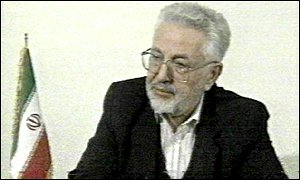
Ebrahim Yazdi failed to comply with a court order
Tehran's Revolutionary Court has issued a warrant for the arrest of an opposition party leader who is currently in the United States.
Ebrahim Yazdi, Secretary-General of the banned Iran Freedom Movement (IFM), failed to meet a court order issued in April to return to Iran by 1 May.
The official Iranian News Agency, Irna, quoted a statement from the Revolutionary Court saying it would seek Mr Yazdi's extradition through Interpol following what it called his "defection".
The statement said: "If he does not surrender himself he will be arrested under international laws."
The IFM supports reformist President Mohammad Khatami
Mr Yazdi, who is in his 60s, is undergoing cancer therapy at an American clinic.
He is wanted on charges of "acting against national security and arms possession".
The action is part of a widespread crackdown against dissidents begun in March by the hardline court.
April arrests
Sixty people, mostly linked to the IFM, were arrested in April and have been held in solitary confinement since then.
They will go on trial within the next two months, accused of "plotting against the regime", the news agency quoted Revolutionary Court chief Ali Mobasheri as saying.
The charge carries the death penalty under Iranian law.
Mr Yazdi, a former foreign minister, has led the IFM since 1995.
The party was banned by the revolutionary courts in April, along with other "nationalist and religious groups".
The IFM is very popular among intellectuals and academics. Although it is opposed to the Iranian regime, it has expressed support for reformist President Mohammad Khatami.
![]()
Woman stoned to death for adultery and murder
A woman, sentenced to death for murder and adultery, was stoned to death Wednesday morning in Tehran's Evin prison, a
judiciary source said. Iran's courts had recently found Maryam Ayoubi, 30, guilty of murdering
her husband with the help of her cousin.
She was also sentenced to 100 lashes, the source said, without saying whether she had been whipped before her execution.
Her husband was murdered last year in eastern Tehran, in the Narmak district.
Adultery is punishable in Iran by stoning to death, according to Islamic law, or Sharia, which has been in force since the country's 1979 Islamic
revolution.
![]()
Stonings should stop in Iran
The Amnesty International
Amnesty International voiced its outrage today at the reported stoning to death of an Iranian woman at Evin prison in Tehran.
"Executions by stoning aggravate the brutality of the death penalty, which in itself is the most extreme form of torture and the ultimate violation
of the right to life. It is a method specifically designed to increase the victim's suffering," the organization said.
Despite Amnesty International's worldwide appeals for 30-year-old Maryam Ayoubi's death sentence to be commuted, she was executed this morning. The
woman had recently been found guilty of adultery and of murdering her husband.
The stoning of Maryam Ayoubi increases concern that the authorities may carry out even more executions by stoning. A woman identified only as
Robabeh was reported on 24 June to have been sentenced to 50 lashes to be followed by death by stoning for adultery. Her unnamed male accomplice had
reportedly been sentenced to 100 lashes and death by hanging.
In renewing its urgent appeals to the Iranian authorities to commute these sentences, Amnesty International is adding its voice to those of
officials, organizations and individuals in Iran who have already voiced their concern over this punishment.
![]()
Bush calls for relaxed immigration rules
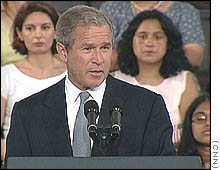
NEW YORK (CNN) -- On his first trip to New York since assuming
office, President Bush on Tuesday called for relaxed U.S. immigration rules at an appropriately historic
location.
The event took place just off Manhattan at Ellis Island, where
ancestors of millions of Americans
first set foot in the United States, to
acknowledge immigrants' importance to the nation and its development.
In his address, Bush committed the
Immigration and Naturalization Service to a goal of processing all applications for U.S. citizenship in six months from
start to finish.
"We should spare families the hardship
of separation while one member is awaiting a Green Card," Bush said. "I support providing an extension of the temporary window that allows people to
file for legal residency without having to return to their country of origin." He
then urged Congress to act swiftly on the matter.
"100 million Americans can draw a straight line from the life they know today, to a moment
inside this hall," Bush said. "Immigration is not a problem to be solved, it is a sign of a confident
and successful nation. Their arrival should be greeted not with suspicion and resentment, but
with openness and courtesy."
![]()
Defiant Milosevic rejects 'political' trial
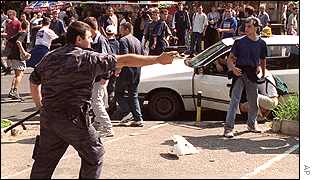
The streets of Belgrade are
tense again
Slobodan Milosevic has spoken defiantly from his prison cell in The Hague amid continuing tension in Belgrade since his extradition.
According to a member of his
defence team, the former Yugoslav president told his wife Mira Markovic that
he rejected the trial as "politically motivated".
The president of the war crimes
tribunal in The Hague, Claude Jorda, has said the trial will not begin for
another eight to 12 months, and is likely to last for over a year.
Mr Milosevic - who is due to make
his first court appearance on Tuesday - said he would deny all the war crimes
charges against him.
In Belgrade, police fired shots
into the air on Saturday to quell an outbreak of violence in the city centre.
A group of skinheads and chanting
Serbian nationalists attacked a peaceful march by gay and lesbian rights
activists, kicking and beating them. At least five people were injured, some
of them seriously.
Turmoil
Mr Milosevic's departure has
triggered political turmoil in Yugoslavia.
His supporters - who demonstrated
in Belgrade on Friday - said they would intensify their protests next week.
His
extradition has jeopardised the fragile cohabitation of reformists and
old-school politicians within the Yugoslav federation.
And it has pitched the two leaders
of the democratic movement - the Yugoslav President, Vojislav Kostunica, and
the Serbian Prime Minister, Zoran Djindjic - against each other.
All the Montenegrin members of the
coalition have resigned, including the Yugoslav Prime Minister, Zoran Zizic.
But Mr Zizic's Montenegrin People's
Party said it would join talks on Monday aimed at forming a new government.
Isolation
The UN tribunal is keeping Mr
Milosevic in isolation, away from the 38 other war crimes suspects from the
former Yugoslavia.
Mr Milosevic is accused of having
ultimate responsibility for the mass deportation of 740,000 Kosovo Albanians
and for the murder of hundreds of individually named Albanians, said to have
been committed by Serb soldiers and militias.
Further charges are also being
drawn up against him relating to the wars in Croatia and Bosnia.
One of his Belgrade lawyers said Mr
Milosevic had asked for money, clothes and some books.
Speaking by phone from his cell to
his wife, Mr Milosevic proclaimed his innocence, saying he had worked as
president in the interests of the Serbian people.
If he had the job again, he is
reported as saying, he would act in the same way.
According to Mrs Markovic, the
former president is in "fantastic" psychological condition.
Disbelief
New details have emerged about his
last moments in Serbia.
The Belgrade weekly newspaper
Nedeljni Telegraf said his last words before leaving Serbia were:
"Brother Serbs, now farewell!"
The paper, which is said to have
good contacts with the Serbian security forces, said Mr Milosevic refused to
believe he was being extradited to the war crimes tribunal, even as he was
packing his bag.
When a prison warden in Belgrade
told him he was going to the tribunal, Mr Milosevic reportedly said: "The
Hague? Ridiculous!" And he kept repeating that to himself.
"Am I really going to The
Hague?" he kept asking, according to the paper.
It said Mr Milosevic first learned
of his impending extradition at 1520 (1320 GMT) on Thursday, when Serbian
justice officials arrived at the prison in Belgrade.
Departure
Later he was taken to a state
security compound in a Belgrade suburb, where officials from the war crimes
tribunal were waiting.
Mr Milosevic told them the tribunal
was a "political circus aimed at jeopardising the Serb people".
He said he was being
"kidnapped," and that the tribunal would answer for its crimes.
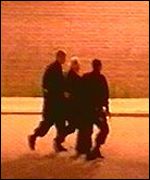
![]()
Guards 'damage' Iran's heritage
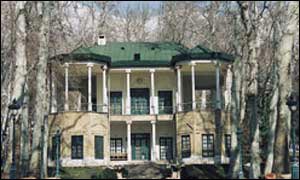
Thousands of trees have
been left to dry
They may have survived wars and changes in dynasties but some of Iran's historic monuments are now falling prey to new landlords determined to use the lucrative properties for their own purposes.
One such victim is the Palace of Ahmad Shah - now a training centre for the "Sister's" paramilitary unit of the Revolutionary Guards.
Many
facades of the building, the oldest of a dozen palaces at the 200 year-old Royal
Niavaran Grounds, have been damaged, according to Tehran's Aftab newspaper.
The mirrored walls and plaster
moulding have been removed, the grounds are being sealed behind barbed wire and
several thousand fruit trees are left without watering, the paper said.
The current manager of the palace, Mr
Jamali, accepts that some rebuilding has taken place but says it the National
Heritage Organisation should have supervised the work. He also denies the area
is being used for military training.
National Heritage head Abdolali Pour
says the changes are illegal.
![]()
Egyptian screen star dies

Hosni with Rushdi Abaza in
Sunset and Sunrise
Souad Hosni, an Egyptian actress beloved throughout the Arab world, has died in London at the age of 58.
Egyptian television interrupted its programming to announce the death of the actress, who starred in some 75 films.
State Television reported President Hosni Mubarak to be involved in plans to repatriate her body, while admirers mourned her loss.
"She
is part of a beautiful period that we all lived in," said Egyptian novelist
Gamal al-Gheitany.
"She is a symbol of days of
vigour and liveliness, and now these days are over."
Hosni was born in Cairo on 26 January
1943 - one of a family of 17 children.
Her career began at the age of three
when she sang on the popular children's radio programme Papa Sharo.
![]()